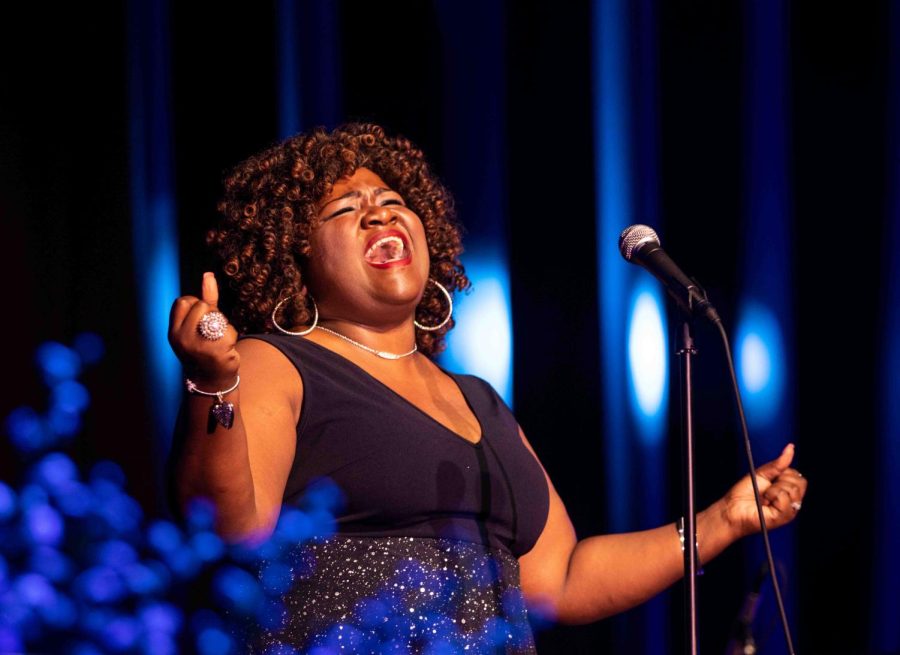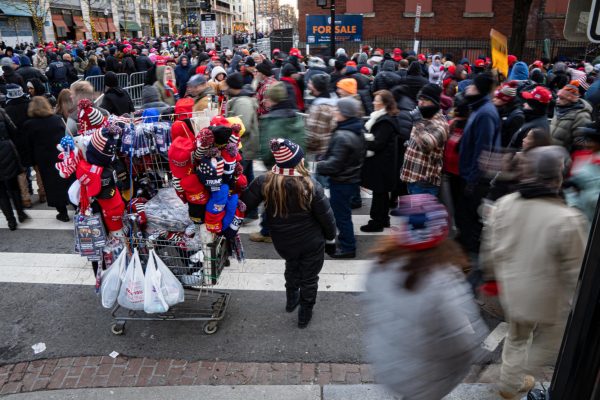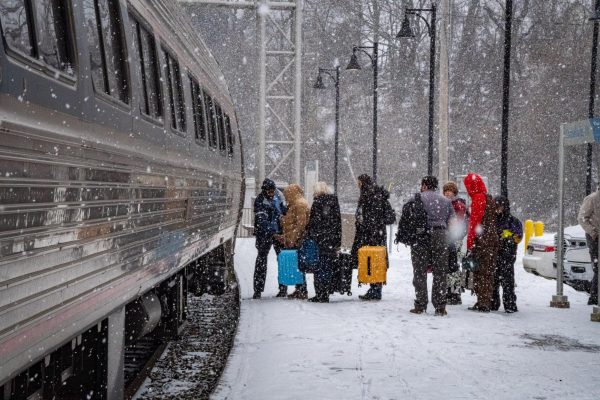Cabaret community celebrates the return of a live audience at Chicago Cabaret Professionals annual gala
October 27, 2022
Beneath chandeliers hung from the vaulted ceiling of the Epiphany Center for the Arts ballroom, women in floor-length evening gowns and fur boas circled candle-lit tables alongside men in tuxedos. On stage, cabaret performers oscillated between Broadway, blues, barbershop, jazz and the Great American Songbook. One prevailing element shared by many guests and performers that evening — sequins.
During his medley of “I Won’t Dance” and “I’ve Got Rhythm,” performer Paul Motondo pointed to his sequined footwear. “I wore my sparkly shoes!” he quipped to his onstage partner, Carolyn Wehner.
“I wore my sparkly jacket!” Wehner quipped back from her seat at the piano.
Chicago Cabaret Professionals, or CCP — a nonprofit alliance that offers performances, benefits, workshops and networking events for the Chicago cabaret community — hosted its annual gala at the Epiphany Center to present the 2022 Chicago Cabaret Professionals Awards. The Oct. 17 event was particularly celebratory because it was the CCP’s first in-person gala in two years, and a live audience is integral to cabaret as an art form.
“There’s no fourth wall,” said the night’s National Honoree Jeff Harnar. Harnar is a multiple award-winning New York director, nightclub singer and recording artist who grew up in the Chicago area.
“In a Broadway show, there would be the illusion that the audience is not there. Here, the audience is the scene partner,” Harner said. “Our work isn’t complete; there isn’t a complete molecule until the audience is here. It’s totally informed by that interplay, so it’s magical.”
Cabaret performances encompass many genres, including gospel, pop, burlesque, dance and more. Performers often interrupt songs mid-way to patter with the pianist, do call and response or crack jokes with the audience.
Historically, cabaret has been an open space for boundary-pushing avant-garde styles that reacted to trends, often utilizing risqué lyrics and double entendres to energize the audience, according to music resource site AllMusic.
Cabaret’s bawdy origins were on display during performer Lynne Jordan’s blues piece, “It Takes a Great Big Woman” — or as she put it, “the Big Fat Woman Song.” Jordan accompanied lyrics like, “It takes a great big woman with massive breasts” with a chest shimmy and an extended side leg raise, all while wearing a top hat and sequined evening wear.
Later, during a Doris Day medley, performer Daryl Nitz joked with a few audience members in the VIP section who had begun singing along. “Don’t sing it with me, b—-es!” Nitz said with a laugh. He turned to the rest of the crowd. “They’re giving me harmony over here.”
Harnar was one of the seven artists presented with awards at the gala. Other awardees included Wydetta Carter, Cynthia Clarey, Laura Freeman, Tommy Hensel and Charles Troy.
Lastly among the seven honorees was Columbia alum LaShera Moore, who graduated in 2012 with a bachelor’s in music and a concentration in vocal performance. Moore received the Emerging Artist Award and Denise Tomasello Scholarship.
After receiving her award, Moore performed “And I Am Telling You I’m Not Going” from “Dreamgirls.”
Moore called the stage her second home.
“There’s no restrictions when it comes to doing cabaret,” Moore said. “I think that that’s the beauty of it, is that you get to create something that you love.”
As the first person to ever receive the Denise Tomasello Scholarship, Moore said she plans to use the grant to create and produce her own show. She is still brainstorming ideas, which might include an homage to influential female vocalists or to her greatest idol, Aretha Franklin.
Several local venues host cabaret performances, such as Davenport’s Piano Bar, Le Piano and Drew’s on Halsted, according to CCP board member Charles Kouri. But he said many smaller clubs also host cabaret performances, like the Epiphany Center and Hey Nonny in Arlington Heights.
Moore had advice for aspiring cabaret performers. “There is no bar. There’s nothing holding you back. You just go out and do your thing and you share your gift.”








